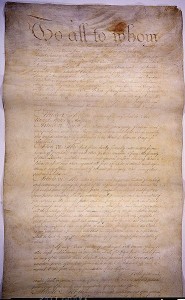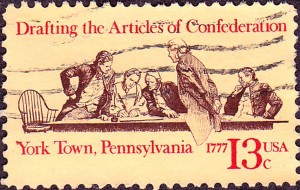Perpetual Does Not = 1778-1860
From The New-York Times June 10 1861
The Union not a League.
To the Editor of the New-York Times:
SIR: Allow me to throw out this idea on the subject of Secession. Perhaps it is not original with me. When our war of Independence broke out, the colonies held an united allegiance to one Power, Great Britain. They enjoyed no sovereignty, either separate or confederate. They acted in concert in resisting the armies of the mother country, and formed a single Government, which took outward and executive form in the “Continental Congress,” made up of Representatives from them all. Under the name of the “United States of America,” as one people, they fought the war of the Revolution. They gained their independence as a single nation, and that independence was acknowledged to them as a nation, one and indivisible, by the one Power that had exercised an undivided sovereignty over them. The independence or sovereignty of each State was not acknowledged, but of all united, and by a single, treaty. Moreover, during the war in 1778, Articles of Confederation were entered into by all the States, in which it was declared “the Union shall be perpetual.” These Articles were in undisputed force til 1787, when “the people of the United States, in order to form a more perfect union,” ordained and established the present “Constitution of the United States.” The idea I wish to set forth is this: that no one of the States of this Government ever did possess separate sovereignty and independence, and that therefore it is absurd for any of them to pretend to resume or reclaim what they never possessed. South Carolina, like each of the other original States, was a dependency or vice-royalty of Great Britain, up to the very moment that she became a constituent portion of the republic of the United States; and when since has she possessed individual sovereignty? The Constitution, of course, itself, makes no one nation; but we always were one nation ever since, as colonies, we passed from under the dominion of England. A.H.C.
Sometimes I think we all go back and forth between the letter of the law and equity depending on what we think is in our interests or what is in our heart.
The Articles of Confederation was not officially ratified until 1781. South Carolina ratified the Articles on February 5, 1778.


